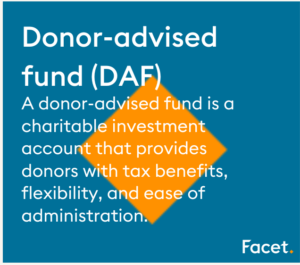
The information provided is based on the published date.
Key takeaways
- Donor-advised funds (DAFs) provide tax benefits and flexibility for charitable giving
- DAFs offer more control over grantmaking than private foundations, with fewer regulations and reduced administrative burden
- Donors can maximize the impact of their DAF through thoughtful investment strategies, recommending grants to eligible charities, naming successors/beneficiaries, and reducing estate taxes
Donor-advised funds (DAFs) have emerged as a popular and practical solution for strategic philanthropy.
In this post, we will explore the ins and outs of DAFs, their tax advantages, how to choose the right DAF sponsor, and various strategies to make the most of your contributions.
Understanding donor-advised funds: Definition and features
A donor-advised fund (DAF) is a charitable investment account that provides donors with tax benefits, flexibility, and ease of administration. Donor-advised funds offer immediate tax benefits, grant donors control over their accounts, and allow them to donate non-cash assets.
Donations of cash, stocks, and non-publicly traded assets are accepted by sponsoring organizations, such as the National Philanthropic Trust, through various charitable giving vehicles. Contributions to a DAF are irrevocable (cannot be changed), ensuring the funds are used exclusively for grantmaking to charities.

Key components of donor-advised funds
Contributions to donor-advised funds can be made via cash, stocks, or non-publicly traded assets, with the sponsoring organization assuming legal control of the funds. DAFs heavily rely on investment growth, as tax-exempt growth allows the assets in the fund to accumulate over time, increasing the amount available for philanthropic contributions.
Donors make grant recommendations to support their philanthropic objectives and determine the charitable organizations they wish to support. The fund administrator reviews and approves grant recommendations, maintaining the donor’s advisory privileges over the distribution of funds.
The growing popularity of donor-advised funds
Donor-advised funds are the most rapidly expanding charitable giving vehicle in the United States. According to the National Philanthropic Trust 2022 Donor-Advised Fund Report, donors added more than $73 billion to DAF accounts in 2021, a 47% increase compared to the previous year.
The convenience of donor-advised funds lies in their flexibility, allowing donors to make a charitable contribution and receive an immediate tax deduction while deciding how the donation should be used.
The democratization of philanthropy has fostered the growth of DAFs, enabling greater grassroots participation in charitable giving and making philanthropy more accessible to a broader range of donors.
DAFs and tax benefits: Maximizing your charitable impact

Donor-advised funds offer significant tax benefits, such as income tax deductions and capital gains tax avoidance, allowing donors to maximize their charitable impact through the added advantage of the tax benefit.
Donors who contribute to a DAF qualify for an immediate tax deduction, with deductions of up to 60% of adjusted gross income for cash donations being possible.
Income tax deduction advantages
Donating to a DAF can provide income tax deductions of up to 60% of adjusted gross income, offering substantial tax savings for donors. The Internal Revenue Service (IRS) regulations state that donors can claim an immediate tax deduction of up to 30% of their adjusted gross income for gifts of:
- appreciated securities (investments with gains)
- mutual funds
- real estate
- other assets
Optimizing the tax advantages of DAFs allows donors to invest for growth, make grant recommendations, and reduce estate taxes, which can further maximize their charitable impact.
Capital gains tax considerations
Donating appreciated assets to a DAF can help donors avoid capital gains taxes, further enhancing the tax efficiency of their charitable giving. Donating long-term appreciated securities directly to charity rather than liquidating them can be a great way to increase tax benefits and the amount granted to the charity. It is an excellent opportunity for donors to get the most out of their donations.
When donors give appreciated assets directly to a DAF, the donor can:
- Deduct the full fair market value of the assets
- Avoid paying capital gains tax on the appreciation
- Resulting in a larger tax deduction compared to selling the assets and donating the proceeds
Types of donor-advised fund sponsors: Choosing the right fit
Selecting an appropriate DAF sponsor is of the utmost importance, as each option offers unique benefits and expertise. They include the following:
- Community foundations provide local knowledge and connections, helping donors make a meaningful impact in their communities.
- National DAF organizations, often affiliated with financial institutions, offer a wide range of investment options and support for donors.
- Public foundations, such as universities and hospitals, focus on specific missions and can provide specialized expertise for donors interested in those causes.
Community foundations
Community foundations as DAF sponsors provide donors with the following advantages:
- Deep community connection and extensive knowledge of local issues
- Ability to give where they live and gain a high level of community expertise and grantmaking
- Simplicity and flexibility in their giving
- Superior income tax charitable deductions compared to private foundations
Numerous projects funded by donor-advised funds through community foundations have experienced success, including:
- Grants that focus on education
- Projects that enhance community health
- Impact investing initiatives
- Support for a variety of charitable activities, including the arts and human services.
National DAF organizations
National donor-advised fund organizations are charitable entities that provide donor-advised funds on a national scale. They provide assistance to donors by:
- Conducting due diligence
- Executing grantmaking
- Simplifying the donation process to nonprofits
- Providing advice on eligible grant recipients
- Assisting donors in combining tax benefits to support charitable organizations
Notable national donor-advised fund organizations include the Vanguard Charitable Endowment Program, the Schwab Charitable Fund, and the Fidelity Giving Account, to name a few.
Public foundations
Public foundations as DAF sponsors typically handle administrative tasks such as managing investments, recordkeeping, tax receipt, and grant administration.
Furthermore, they are known to make grants to various charities and may enable donors to give to charitable projects or foreign charitable organizations. Public foundations are public charities and control the assets of the DAF.
Donor-advised funds vs. private foundations: A comparison
Comparing donor-advised funds and private foundations reveals key differences in legal and regulatory requirements, as well as administrative control and flexibility.
Donor-advised funds provide more flexibility and are subject to fewer regulations, while private foundations are legally distinct entities and must adhere to more rigid tax laws and regulations.
DAFs offer the same charitable advantages of a private foundation but without the hassle of extra expenses or complex administrative tasks. It significantly reduces the paperwork and time associated with running a foundation.
Legal and regulatory differences
Donor-advised funds are typically operated by a section 501(c)(3) nonprofit organization and require a contribution between $5,000 and $25,000 to be established, with no specific legal requirements.
In contrast, private foundations are legally distinct entities and are subject to special oversight rules. Donors may be eligible to receive an income tax deduction of up to 60% of their adjusted gross income for cash donations to a DAF, compared to a 30% deduction for a private foundation gift.
Administrative control and flexibility
Private foundations require more administrative oversight than donor-advised funds, involving hiring staff or consulting outside advisors to handle tax and administrative matters. Conversely, donor-advised funds offer greater flexibility and control over grantmaking without the need for extensive administrative management.
For private foundations, expenses include:
- Compensation of officers
- Salaries and wages of employees
- Outside professional fees
- Interest
- Rent
- Taxes on property utilized in the foundation’s operations
Making the most of your donor-advised fund: Strategies for success

In order to enhance the impact of a donor-advised fund, donors should consider investment strategies for growth and be proactive in making grant recommendations, with due diligence conducted by the sponsoring organization.
Active grant to charity recommendation to eligible charities ensures that the DAF significantly impacts the causes donors hold dear.
Investment strategies for growth
Donors have the option to suggest investment strategies for their DAF assets, allowing for tax-free growth and potentially increasing the funds available for charitable grants.
Asset allocation in a donor-advised fund involves strategically dividing the fund’s assets among various investment options, enabling donors to tailor an asset allocation that aligns with their investment objectives and risk tolerance.
Grant recommendations and due diligence
For active grant recommendations through a donor-advised fund, donors can log into the fund’s website or complete a Grant Recommendation Form specifying the charity, the amount, and any special instructions for the grant.
Sponsoring organizations are responsible for carrying out due diligence for donor-advised funds. This includes:
- Managing the grant process
- Establishing a proposal process
- Conducting due diligence on grant applicants
- Verifying the eligibility of grantees
Legacy planning with donor-advised funds

Donor-advised funds can play a significant role in legacy planning, with options for naming successors, beneficiaries, and reducing estate taxes. Incorporating a DAF into estate planning can help reduce estate taxes and provide ongoing support for multiple charities, further extending the donor’s philanthropic impact.
Naming successors and beneficiaries
Donors can establish a succession plan for their DAF by following these steps:
- Log into your Giving Account.
- Select “Your profile.”
- Navigate to the “Successor” tab.
- Nominate individuals or charities as successors to continue your philanthropic legacy.
Reducing estate taxes
The integration of a donor-advised fund into estate planning might result in tax implications; contributing to a DAF during one’s lifetime may make them eligible for an immediate income tax deduction.
Furthermore, assets that pass to a qualifying charity through a donor-advised fund or private foundation are not subject to any tax, potentially reducing an individual’s estate tax liability.
Final word
Donor-advised funds offer an efficient and impactful solution for philanthropic giving, providing tax benefits, flexibility, and a range of sponsoring organizations to choose from.
By actively engaging in the investment and grantmaking process, donors can ensure their DAF makes a meaningful difference in the causes they care about. Ultimately, incorporating a DAF into legacy planning can help leave a lasting, positive impact on the world.
Frequently asked questions
What are the disadvantages of a donor-advised fund?
Donor-advised funds can be expensive to set up, and donors have limited control over grantmaking. Additionally, funds cannot be used for donor benefits such as tickets or scholarships.
What is a donor-advised fund, and how does it work?
A donor-advised fund, or DAF, is an account established at a public charity allowing donors to make a charitable contribution and receive an immediate tax deduction before recommending grants from the fund over time.
What is the loophole of donor-advised funds?
The loophole of donor-advised funds (DAFs) is that they allow wealthy people to donate money to avoid paying a capital gains tax and give the donated funds to a nonprofit, providing them with charitable tax advantages. However, distributions from a DAF to a private foundation can then change its nature to a public charity, allowing wealthy donors to circumvent the restrictions normally imposed on private foundations.
How much money do you need for a donor-advised fund?
For a donor-advised fund, there is no minimum initial contribution requirement, and the annual fees typically range from 0.5 to 1% of the balance. However, some supporting organizations may require a minimum initial contribution ranging from $0 to $250,000, and you can contribute cash or other assets.
What assets can be donated to a donor-advised fund?
Donations of cash, stocks, cryptocurrency, and private company stock can be donated to a donor-advised fund.
Facet
Facet Wealth, Inc. (“Facet”) is an SEC registered investment adviser headquartered in Baltimore, Maryland. This is not an offer to sell securities or the solicitation of an offer to purchase securities. This is not investment, financial, legal, or tax advice. Past performance is not a guarantee of future performance.


